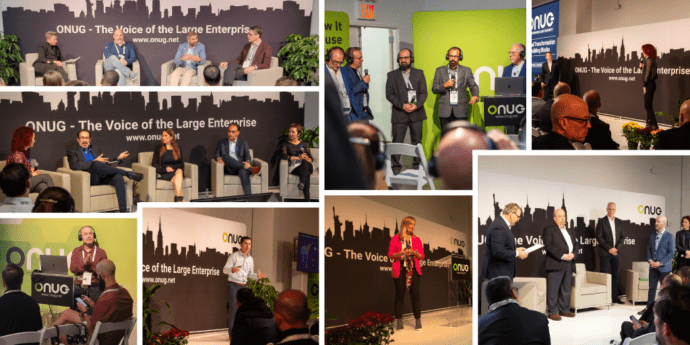ONUG 2021: Bringing It All Together!
Operationalizing Flexible IT Business Platforms at Scale
Hybrid/Multi-Cloud Infrastructure
2020 was a year when executives were forced to make 10 years’ worth of decisions in six months. In 2021, we will reflect on the lessons learned and digest the changes we experienced as we make incremental changes on our digital journeys. For many, digital transformation business models seemed “theoretical” in 2019 but have become essential in 2020. Systemic change occurred rapidly with the largest one being the need for all brands in all industry sectors to become digital to survive and thrive. As a result, digital transformation transcended IT organizations to the executive office suites and in the process, flexible IT platforms like cloud computing transformed IT to a business platform.
With this transformation comes great opportunity and responsibility for executives and technologists who will use it to service customers, partners and suppliers digitally. Their suppliers of cloud computing and IT will move up in the large enterprises’ supply chain as they become central to a brand’s ability to digitally transform.
In 2019 and 2020, technology groups operated in silos and used projects to drive integration. In 2021, silos will wane, thanks to business outcome demands driving horizontal organizational models to deliver digital value. This is a fundamental shift in organization where IT is a business platform. Gone are the days when IT groups were abstracted from the business demands and desired outcomes. IT is now unvarnished, not only as a full participant in business value delivery, but responsible for results and outcomes.
2021 is a planning year. It’s about being reflective on the decisions that were made during the pandemic and choosing which ones to operationalize. Many corporations will be exiting public cloud experiments, or proofs of concept, in 2021 and moving into production. This sums up 2021: it’s to get ready for 2022, the year of the great enterprise cloud scale up. But to scale you need to operationalize and automate.
Planning for scale will be a 2021 priority because the future depends upon it. All aspects of a corporation’s operations are rapidly being transformed digitally, thanks to a new fundamental truth: brand loyalty is defined by a customer’s digital interaction experience and their consumption of your brand. Match a great digital experience with fulfillment, and you have brand loyalty. Thus, corporate operational workflows around supply chain management, customer experience, application delivery chains, partner relationships, et al., are under review for digitalization and automation via AI.
Layer on top of this an external accelerator to digitally transform, that is a renewed emphasis on sustainable business practices. In the early part of 2021, Wall Street analysts will increase pressure on executives to report their carbon footprint, rewarding those who show progress with greater market capitalization. Consumers are increasingly demanding sustainable green business practices from the brands they choose to consume. Look no further than Tesla to understand the power of a sustainable energy brand. Expect executives to place this pressure on all aspects of their business operations especially IT where workloads consume 60% less electric power in public clouds than private data centers.
Being a green sustainable digital enterprise or brand is the entry level into the digital economy. To get there, most corporations will require a new set of frameworks and runbooks. It’s easy to consume a cloud service; it’s hard to restructure operations and their runbooks to integrate and consume cloud services. The ONUG Community will continue to build upon their IT infrastructure in 2021, but much of these buying decisions will be looked through the lens of operationalizing Flexible IT Business Platforms at Scale.
Flexible IT Business Platforms Building Blocks
There are five building blocks of flexible IT business platforms:
- Governance and control;
- Operating systems;
- Development environments, programming languages, testing, automation;
- Infrastructure for application delivery such as hybrid/multi-cloud/private data ecosystems/etc.;
- Consumption access methods, remote access, zero-trust, SSO.
In 2021, ONUG will focus on all aspects of these building blocks with a special attention toward cloud governance and control, infrastructure and consumption access methods.
There are a few givens for 2021:
- Remote workforces will stay mostly remote, defining the new way of work.
- SaaS consumption will rise significantly.
- Networking and security technology and markets will combine to deliver zero-trust solutions for the remote workforce.
- The concept of a network perimeter as a security mitigation strategy is waning, giving way to application-based security.
- There will be a major de-acceleration of networking hardware consumption as NaaS consumption rises.
- All corporations are moving in the same direction in terms of cloud consumption; all will end up being multi-cloud consumers.
To build, run, secure and SCALE an enterprise cloud, the building blocks that enterprise technologists choose need to be integrated and operationalized, which means tooling and runbooks. Tooling for the enterprise cloud will skyrocket in 2021, especially those tools that enable corporations to secure and control multi-cloud environments. This is especially acute for those tools that enable on- and off-prem cloud governance and automate their controls. At ONUG, the focus in 2021 is the building of the Cloud Security Notification Framework, which is a set of standard definitions and syntax across cloud providers so as to reduce multi-cloud tooling and personal bloat.
ONUG will bring it all together with academics, industry experts, IT executives, vendors and suppliers, analysts, et al., who will help you develop your strategy and models to best take advantage of 2021’s planning opportunity to accelerate your organization’s digital business platform.


